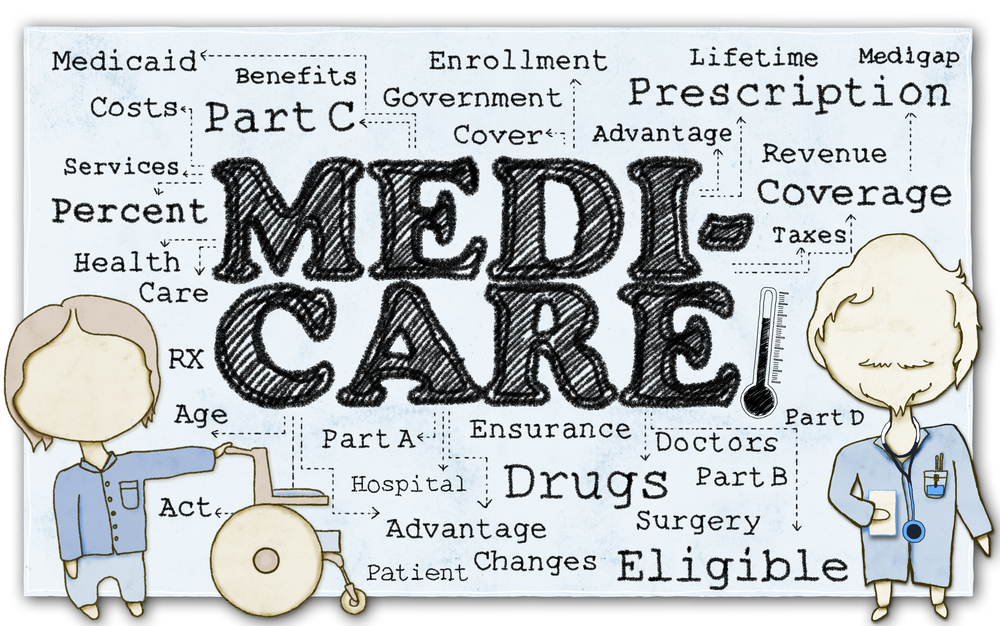A Quick Look At Medicare Part A
Medicare is a federal health insurance program designed for those aged 65 or over in addition to younger individuals who have certain disabilities or end-stage renal disease. The program is composed of several parts, each addressing different elements of the health plan. Here we focus on Medicare Part A to provide a broad idea of what it covers.
A Quick Look at Medicare Part A
Inpatient Hospital Care
Inpatient hospital care refers to the care you receive once admitted to a hospital by a physician and spend at least one night in the care of hospital personnel. One example of this is being admitted for planned events such as surgery or specialized neurological or cardiology procedures, but it also applies to unplanned events like illness or traumatic injuries.
Part A of Medicare coverage applies to stays in a general hospital that last up to 90 days per benefit period, and there is an additional lifetime reserve of 60 days. Part A also covers stays in a Medicare-certified psychiatric hospital for up to 190 lifetime days.
Home Health Care
Generally speaking, Medicare considers certain individuals to be homebound if they require the help of another person to leave their home, making it very difficult for them to do so. It also applies in cases where a doctor believes that leaving home will cause illness or general health to worsen. Part A covers the cost of skilled health care for those who are certified as homebound.
Daily care is covered for up to 100 days, and patients may receive unlimited intermittent care. It’s important to note that to qualify for this coverage, patients must have been a hospital inpatient for at least three consecutive days within 14 days of receiving home health care. If these requirements cannot be met, it is possible to qualify for home health care through Medicare Part B.
Skilled Nursing Facility Care
A skilled nursing facility (SNF) is an inpatient medical treatment or rehabilitation center that is staffed with a variety of skilled medical professionals such as physical therapists, licensed nurses, and speech pathologists. SNFs typically function as temporary residences for patients who are undergoing medical rehabilitation and require health care assistance around the clock.
Part A of the Medicare plan covers room, board, and multiple services that are offered at a skilled nursing facility for up to 100 days each benefit period. These include things like wound care, tube feeding, and medication. In addition to being in need of skilled nursing or therapy care, patients must have been a hospital inpatient for at least three consecutive days within 30 days of being admitted to the SNF.
Prescription Drug Coverage
While Medicare Part D covers most prescription drug costs, Part A provides coverage for drugs that patients require during any Medicare-covered stay in a general hospital or skilled nursing facility. Importantly, if a patient is receiving SNF care that is not covered by Part A, costs for necessary drugs may be covered by Part D.
This is a general overview of what is covered in Part A of the Medicare health insurance program. Contact Brooker Medicare if you have any additional questions to seek expert assistance in all things related to Medicare.
Medicare Prescription Plans: What Do They Cover?
Medicare prescription plans can help you cover the costs of expensive medications. If you have Medicare coverage, your prescriptions will be covered under Medicare part D of your plan. These are some important things you should know about your coverage.
Medicare Prescription Plans: What Does Medicare Part D Cover?
Prescription Drugs
If you have an illness or injury, you might be prescribed prescription drugs by your doctor. Your doctor is prescribing these to you because they believe that they will be the most effective way to treat what you are going through. Unfortunately, some of these drugs can get expensive.
When you get a Medicare plan for your prescriptions, your prescription drugs will be covered under this plan. Most plans will have a list of specific drugs that they cover. If the drugs that your doctor has prescribed aren’t covered on the list, there is likely to be something similar. If none of these options will work for you, you can ask your representative for an exception.
Generic Drugs
Some Medicare plans also cover generic drugs. You can check with your plan provider to see if generic drugs might be covered under your plan and what drugs, in particular, will be covered. Generic drugs are copies of name-brand drugs. Taking them instead of name-brand drugs may save you some money.
Generic drugs will use the same formula as brand-name drugs, and they’ll have the same dosage amount, safety protocols, and intended use as brand-name drugs. There may be some instances where there is no generic version of a name-brand drug you have been prescribed. If you would like to take a generic drug, talk to your doctor about your options.
The Different Tiers
There’s no denying that even with coverage, drugs can get expensive. To help keep your costs reasonable, many plans will place drugs into different tiers. Drugs in lower tiers will likely cost you less than drugs in higher tiers.
There might be some cases where your doctor tells you that you need a drug in a higher tier rather than a similar drug in a lower tier. If you’re looking to save on costs, you can call your plan representative and ask if you can get an exception and reduce the cost of your payments.
What Else Does Medicare Cover?
Along with drug coverage, your Medicare coverage can help you with a range of other things too. If you need to receive inpatient care at a hospital, you require home health care, or you need nursing home care, there are some plans that can help you.
You can also receive coverage for things like medically necessary services which include ambulances, medical equipment, inpatient and outpatient coverage for mental health-related conditions, and preventative services to help keep conditions from becoming more serious.
There comes a time in many people’s lives when they need a prescription for something. To save on prescription costs, a Medicare coverage plan can help a lot. Your doctor and Medicare representative will have more information on how your coverage can help you.
Medicare Part C: Is A Medicare Advantage Plan Right For You?
While every American who reaches age 65 becomes automatically enrolled in the Original Medicare plan that includes Part A, inpatient, and Part B, outpatient care, this traditional health plan doesn’t provide Part C coverage for dental, vision, hearing, and prescription drugs. Advantage Medicare plans, that include Medicare Part C benefits and often more, may be the better choice for you if you need those health products and services and meet the eligibility criteria.
Medicare Part C: Is a Medicare Advantage Plan Right for You?
What’s Your Eligibility?
Unlike Original Medicare with the Part A and B plans that are government-operated and public, Medicare Advantage Part C plans are private health insurance options that medical insurance companies run. Enrollees with pre-existing medical conditions are eligible for Part C Medicare plans. All enrollees for Part C Advantage plans must already be enrolled in Original Medicare.
With Original Medicare, you most likely won’t require a doctor’s referral to specialists, but you probably will with Advantage Medicare. You also won’t be eligible for an Advantage plan unless you meet the requirements for how far your home is from the local health care providers your plan includes. For that reason, it’s essential to know which local doctors and other health care providers you will have covered access to if you choose Advantage Part C Medicare.
Are You a Frequent Traveler?
With both Medicare options, you’ll be covered when traveling within the United States. if you require hospital care or specific tests or disease treatment under Part A and Part B, but if you’re on an Advantage Plan, the Part C coverage won’t apply when you’re out of your local area. You won’t be covered for your Plan C health care products and services until you’re back home. So, if you’re not likely to travel outside your area, an Advantage plan might be right for you.
Will You Save Money?
Since Original Medicare doesn’t include dental, hearing, vision, and prescription drug coverage, a Medicare Advantage Plan can work well for many enrollees and save them money in out-of-pocket costs. Part, A care in both Original and Advantage Medicare covers only hospital and inpatient care. At the same time, Part B provides coverage for outpatient services and yearly check-ups, screenings, vaccines, mental health counseling, and disease treatment.
But most health insurance enrollees do need coverage for prescription drugs and one or more other areas such as hearing or dental. Plus, with a Part C Medicare plan, your out-of-pocket medical expenses may be lower than with the traditional version since once you reach your yearly spending cap, you don’t pay for the rest of the year. Just be sure you know what exactly your Part C coverage is within your individual Advantage Medicare plan.
Are Your Needs Met With a Particular Part C Plan?
All Part C Medicare plans have to cover urgent and emergency care by federal law. But other than that, Advantage Medicare plans differ significantly between insurance companies. Most Medicare Advantage Part C plans also cover prescription drugs, dental, hearing, and vision, but some offer additional benefits like transportation to and from medical appointments, adult day care services, fitness program coverage, or specific disability or illness coverage.
Need help deciding if Part C Medicare coverage is right for you? Brooker Medicare has over 15 years of experience helping Americans understand all Medicare options because what’s right for one person may not be the best fit for someone else. Contact your licensed Medicare specialist, Brooker Medicare, today to find the best Medicare plan for you.
Medicare Supplement Vs. Medicare Advantage Prescription Drug Plans
Medicare Supplement and Medicare Advantage Prescription Drug Plans are not the same.
Original Medicare
- Original Medicare includes Medicare Part A (Hospital Insurance) and Part B (Medical Insurance).
- If you want drug coverage, you can join a separate Part D plan.
- To help pay your out-of-pocket costs in Original Medicare (like your 20% coinsurance), you can also shop for and buy supplemental coverage.
- You can use any doctor or hospital that takes Medicare, anywhere in the U.S
Medicare Advantage
(also known as Part C)
- Medicare Advantage is an “all in one” alternative to Original Medicare. These “bundled” plans include Part A, Part B, and usually Part D.
- Plans may have lower out-of- pocket costs than Original Medicare.
- In most cases, you’ll need to use doctors who are in the plan’s network.
- Most plans offer extra benefits that Original Medicare doesn’t cover — like vision, hearing, dental, and more.
How Medicare Advantage plans work
Medicare Advantage (MA) plans (also known as Medicare Part C) combine doctor, hospital and, in many cases, even drug coverage into one plan. Most MA plans also include coverage for routine dental, vision and hearing care, as well as other services. These plans are offered by private insurers who contract with the federal government. They are required by law to provide—at minimum—all the benefits of Original Medicare, with the exception of hospice care.
While you can’t add a Medicare Supplement plan to a Medicare Advantage plan, the added benefits MA plans provide help make up the difference when it comes to out-of-pocket costs. One great feature is the security of an annual limit on out-of-pocket costs, after which you pay nothing for covered services.
Medicare Advantage is growing in popularity
The trend is undeniable. Between 2008 and 2018, Medicare Advantage enrollment grew from 9.7 million, or 22% of all Medicare beneficiaries, to nearly 20.4 million, or 34% of Medicare beneficiaries.1
By 2028, more than 41% of Medicare members are expected to choose Medicare Advantage plans.2
*Costs for Medicare Supplement plans vary by the state you live in and the plan you choose. Medicare Supplement plans can only be paired with Original Medicare.
Sources
- “A Dozen Facts About Medicare Advantage,” Gretchen Jacobson, Anthony Damico, and Tricia Neuman, Kaiser Family Foundation, last accessed June 2019, kff.org/medicare/issue-brief/a-dozen-facts-about-medicare-advantage/, opens new window
- “4 in 10 Medicare beneficiaries expected to be on Medicare Advantage plans by 2028,” Eli Richman, last accessed June 2019, fiercehealthcare.com/payer/4-10-medicare-enrollees-expected-to-be-medicare-advantage-by-2028
Stand Alone Prescription Drug Plans Vs. Medicare Advantage Plans
Medicare offers prescription drug coverage for everyone with Medicare. This coverage is called “Part D.” There are 2 ways to get Medicare prescription drug coverage:
How Medicare Prescription Drug Coverage Works with a Medicare Advantage Plan or Medicare Cost PlanRevised May 2018Medicare offers prescription drug coverage for everyone with Medicare. This coverage is called “Part D.” There are 2 ways to get Medicare prescription drug coverage: 1. Join a Medicare Prescription Drug Plan (PDP). These plans add coverage to Original Medicare, and can be added to one of these:• A Medicare Savings Account (MSA) Plan.• A Medicare Private Fee-for-Service (PFFS) Plan, if it doesn’t offer Medicare prescription drug coverage.• A Medicare Cost Plan if it doesn’t offer Medicare prescription drug coverage, or if it does offer Medicare prescription drug coverage but the enrollee doesn’t elect the drug coverage.2. Join a Medicare Advantage Plan— like a Health Maintenance Organization (HMO), Preferred Provider Organization (PPO), Private Fee-for-Service (PFFS) Plan or Special Needs Plan (SNP)— or another Medicare health plan (like a Medicare Cost Plan) that includes prescription drug coverage. Medicare Advantage plans that include prescription drug coverage are sometimes called “MA-PDs.” You’ll get all of your Medicare coverage including Medicare Part A (Hospital Insurance), Medicare Part B (Medical Insurance), and Medicare Part D (prescription drug coverage), through these plans. Medicare drug plans are run by insurance companies and other private companies approved by Medicare. Each plan can vary in cost and drugs covered. If you decide not to join a Medicare drug plan when you’re first eligible, you may pay a late enrollment penalty if you choose to join later.
Drug coverage when you have a Medicare Advantage PlanIf you join a Medicare Advantage Plan, the type of drug coverage you can get depends on the type of Medicare Advantage Plan you have:• Medicare PPO Plans—You may get services from providers outside the plan network, but you typically pay less when using plan network providers. PPOs usually offer Medicare prescription drug coverage, but they’re not required to offer it. If the PPO doesn’t offer Medicare prescription drug coverage, you’re not permitted to get coverage by joining a separate Medicare Prescription Drug Plan (PDP).• Medicare HMO Plans—You must use network providers for non-emergency care. HMOs usually offer Medicare prescription drug coverage, but they’re not required to offer it. If the HMO doesn’t offer Medicare prescription drug coverage, you’re not permitted to get coverage by joining a separate Medicare Prescription Drug Plan (PDP).• Medicare PFFS Plans—You can go to any provider in the U.S. who’s state licensed, is authorized to provide services under Medicare Part A and Part B, accepts the plan’s terms and conditions of payment, and agrees to treat you. However, if your plan has a network of contracted providers, you will typically pay less if you go to a contracted provider. If your plan has a network of contracted providers, you may go to any contracted provider. PFFS plans may or may not offer Medicare prescription drug coverage. If they don’t offer it, you can still get coverage by joining a separate Medicare Prescription Drug Plan (PDP).• Medicare MSA Plans—Money is placed in an account to use for health care before meeting the deductible in a high-deductible plan. After the deductible is met, your plan covers services and you’re responsible for cost-sharing. MSA plans don’t offer Medicare prescription drug coverage. However, you can get drug coverage by joining a separate Medicare Prescription Drug Plan (PDP).• Medicare SNP Plans—You can only enroll in a SNP if you’re a member of the “special needs” population that the plan serves. SNPs are required to offer Medicare prescription drug coverage.Drug coverage when you have a Medicare Cost PlanYour Medicare Cost Plan may or may not offer Medicare prescription drug coverage. Even if it does offer Medicare prescription drug coverage, you can choose not to accept the cost plan’s drug coverage and join a separate Medicare Prescription Drug Plan (PDP)
What else do I need to know?If you have prescription drug coverage from a Medicare health plan:• Your benefits may change each year.• The plan will send you an “Evidence of Coverage” each year. This document tells you what benefits the plan will cover, how much you’ll pay, how to file an appeal, and more. • The plan will also send you an “Annual Notice of Change” each fall. This notice has information about any changes in benefits, costs, or service area that will be effective January of the next year. If the plan covers prescription drugs, the notice will include changes to the formulary of drugs the plan will offer next year. You should review this notice carefully to learn about changes for the upcoming year to decide if you want to look at other plans in your area.
About Insurance
Not all life Insurance policies are created the same. Traditional life Insurance policies only allow you to get the proceeds when a person dies. We use carriers that not only pay upon death, but also allow access to the death benefit while the insured is alive. Having access to the policy proceeds while alive can in most cases prevent a financial catastrophe if the person cannot work. Policies with living benefits allow access to the death benefit if the person has a life changing event, i.e. critical illness, chronic illness or critical injury.
Finding the right major medical health insurance coverage for you, family or business can be challenging. It can be confusing if you don’t know how health insurance works. We explain all the details to help you make the right choice. Whether it’s a hmo or ppo plan, high deductible or low deductible plan our job is to help find the one that fits your lifestyle and most definitely your budget. Having a licensed and skilled agent that you can call on is important when trying to pick a plan for your needs. We’ve been serving our clients for almost 10yrs.
We offer insurance plans that would cover the owner/partnership in the event that one or the other becomes disabled or dies. We help explain how putting this in place would help the company survive the blow of losing the person who makes the business work. The company can use the insurance proceeds for expenses or debts until a replacement or a resolution is found.
Is Assisted Living Covered By Health Insurance?
The United States, like many other developed nations, has seen an increase in elderly citizens. As a result, demand for assisted living and other forms of elder care has increased significantly in recent years. This trend is sure to continue, and it has many families wondering how to pay for assisted living. Health insurance may cover some of the expenses associated with care for the elderly, but to minimize costs, families must look for multiple sources of support.
Is Assisted Living Covered by Health Insurance?
Elder Care Costs
Assisted living is expensive. Although the cost varies from state to state in keeping with the average cost of living, the national average is around $4,300 a month. It should be noted that assisted living is more affordable than a nursing home, which provides a greater degree of assistance and has qualified medical personnel on hand at all times. In either case, most elderly residents in these facilities will remain there for an average of two to three years.
When you consider the average cost and average time spent in such facilities, families may face costs of over $120,000 for assisted living alone. This expense often forces elders to use a significant portion of their retirement savings or social security benefits. However, insurance can alleviate some of the financial burden on families in this situation.
What Will Insurance Cover?
Medical insurance plans may cover a portion of the costs associated with assisted living or nursing homes, but it depends on the situation. In general, insurance is more likely to cover the costs of assisted living when a doctor calls for a stay in an assisted living facility. For example, after a major operation like a hip transplant, a doctor may recommend that the patient spend several months in an assisted living facility to make rehabilitation easier.
When a doctor prescribes assisted living, insurance companies may be able to cover the costs if there is an in-network facility nearby. However, few insurers have in-network facilities, and doctors often recommend short stays. The end result is that insurance rarely covers enough of the cost.
Medicaid Covers Assisted Living
Although Medicare will not cover assisted living costs, Medicaid does. The exact amount varies from state to state, but Medicaid can significantly reduce the cost of assisted living or nursing home care. Coverage includes essential services like nursing and rehabilitation, along with dietary services and room maintenance. Personal comforts like clothing or amenities like a TV may not be covered.
Combine Your Sources
The best way to pay for assisted living is to pool resources from a variety of sources. Medical insurance can cover intervention from doctors and prescription medications. Medicaid can help with assisted living costs. Withdrawing funds from certain life insurance plans or retirement benefits can lessen the burden as well without destroying one’s entire nest egg.
If you need help enrolling in government programs like Medicare or Medicaid to get benefits for assisted living, contact Brooker Medicare to speak to one of our experts.
What Is Indexed Universal Life Insurance?
There are several different types of insurance policies that provide financial relief when the policyholder passes away. However, the sheer multitude of policies available can be confusing for newcomers. In particular, indexed universal life insurance (IUL) is one of the least understood. Nevertheless, this kind of policy offers many benefits for the holder and can yield financial benefits in the long term. Learn more to determine whether this is the right policy for you.
What Is Indexed Universal Life Insurance?
A Flexible Insurance Policy
Like other life policies, IUL provides a payout when the policyholder passes away. However, IUL adds an extra variable to the equation. Instead of just paying a monthly premium, IUL includes a cash account that receives interest payments. You can make contributions directly to this cash account if you wish, or you can watch it grow as interest accumulates over time. Generally, people make large additional payments to accrue more interest.
The interest you gain is determined by the index, which is how this policy gets its name. You can choose from a number of indexes, but the most common ones track the stock market, like the NASDAQ or S&P 500. When the index shows gains, a corresponding amount goes into your account. The payment on your cash balance is calculated by multiplying the index’s performance by your balance and then adjusted using a participation rate set by the policy.
Low Risk With Solid Returns
When you opt for IUL, you don’t expose yourself to the full risk of the stock market. Your money is not literally invested into any equities, which means that even if the stock market crashes, you will not see the value of your account wither away. In months when the market drops, IULs simply do not pay any interest to your account. This means that you effectively cannot lose. How can insurance brokers offer such a deal?
In reality, your money goes into the hands of investment bankers who know how to beat the index. If the index goes up by 5%, they only have to give you 5% even if they secretly made 12% making their own trades. However, since you aren’t actually investing the money, you don’t have any of the risk. It’s a reasonable tradeoff: You won’t lose your investment, but someone else might be able to make a bit more off of it.
Tax Benefits
Aside from the lack of risk and generally above-average ROI, another benefit is that the gains on your cash value are tax deferred. You only have to treat them as income when you decide to withdraw. You can withdraw the cash value at any time.
Is IUL Right for You?
The ideal IUL policyholder is often someone on the younger side who is looking for a life policy but also wants to see their money grow. However, if you aren’t sure what kind of life policy is best for you, ask an expert. Contact Brooker Medicare to learn more about insurance policies and other ways to ensure your financial future and that of your family.
Difference Between Living Benefits & Traditional Life Insurance
Term life insurance is easier to understand and costs much less than whole life insurance, but it has an end date.
Buying life insurance now provides a financial safety net for your dependents later if you’re not around to take care of them.
After you’re gone, your family can use the proceeds to cover funeral costs, mortgage payments, college tuition and other expenses.
There are two main types of life insurance:
Term life insurance is the easiest to understand and has the lowest prices. You can get life insurance quotes online.
Permanent insurance is more complex and tends to cost more than term, but it offers additional benefits. Whole life is the most well-known and simplest form of permanent life insurance. Other kinds of permanent life insurance include universal, variable and variable universal.
Want to know more? Let’s take a closer look at term life insurance versus whole life insurance.
Whole life insurance explained
Like all permanent life insurance policies, whole life provides lifelong coverage and includes an investment component known as the policy’s cash value. The cash value grows slowly, tax-deferred, meaning you won’t pay taxes on its gains while they’re accumulating.
You can borrow money against the account or surrender the policy for the cash. But if you don’t repay policy loans with interest, you’ll reduce your death benefit, and if you surrender the policy, you’ll no longer have coverage.
Like all permanent life insurance policies, whole life provides lifelong coverage and includes an investment component.
Although it’s more complicated than term life insurance, whole life is the most straightforward form of permanent life insurance. Here’s why:
- The premium remains the same for as long as you live
- The death benefit is guaranteed
- The cash value account grows at a guaranteed rate
Some whole life policies can also earn annual dividends, a portion of the insurer’s financial surplus. You can take the dividends in cash, leave them on deposit to earn interest or use them to decrease your premium, repay policy loans or buy additional coverage. Dividends are not guaranteed.
Article by www.nerdwallet.com







